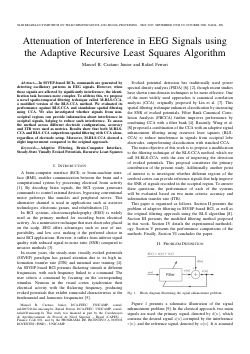
Attenuation of Interference in EEG Signals using the Adaptive Recursive Least Squares Algorithm
Manoel Ribeiro Caetano Junior, Rafael Ferrari
DOI: 10.14209/sbrt.2025.1571157336
Evento: XLIII Simpósio Brasileiro de Telecomunicações e Processamento de Sinais (SBrT2025)
Keywords: Adaptive Filtering Brain-Computer Interface Steady-State Visually Evoked Potentials Recursive Least Squares
Abstract
In SSVEP-based BCIs, commands are generated by detecting oscillatory patterns in EEG signals. However, when these signals are affected by significantly interference, the identification task becomes more complex. To address this, we propose a novel spatio-temporal filtering technique called M-RLS-CCA, a modified version of the RLS-CCA method. We evaluated its performance against RLS-CCA and standalone temporal filtering using CCA. We also investigated whether signals from non-occipital regions can provide information about interference in occipital signals, helping to reduce such interference. To assess the method across different electrode configurations, accuracy and ITR were used as metrics. Results show that both M-RLS-CCA and RLS-CCA outperform spatial filtering with CCA alone, regardless of electrode setup. Moreover, M-RLS-CCA showed a slight improvement compared to the original approach.Download